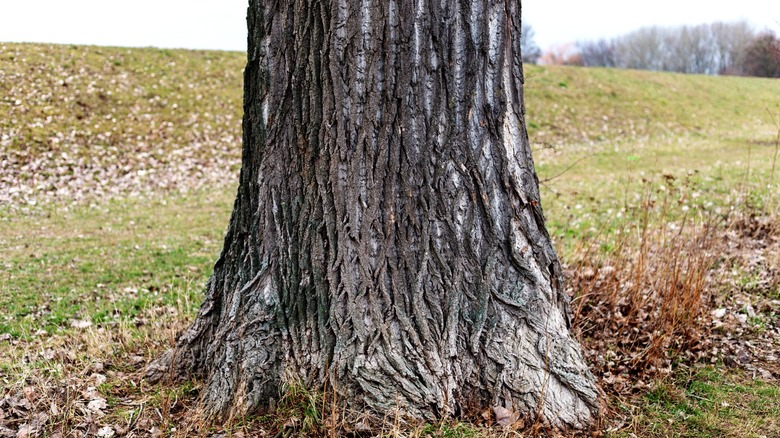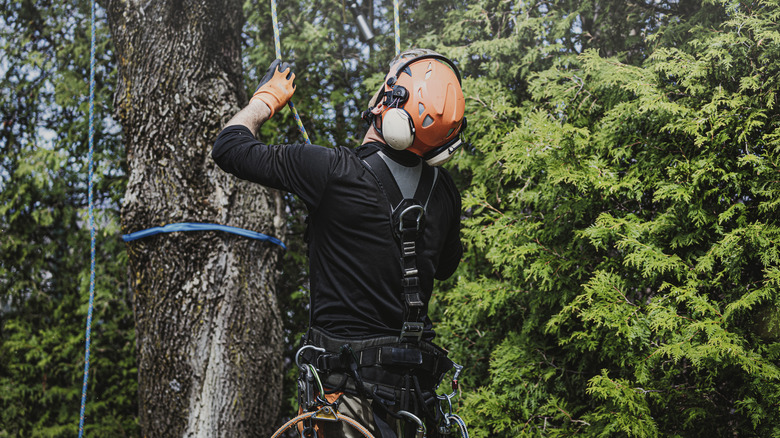What Does It Mean If The Tree In Your Yard Sounds Hollow?
Taking care of the trees in your yard might make you feel like something of a tree hugger, and you should live up to that name every once in a while by going up to your tree and giving it a warm embrace and a little tap with a tool handle. We're not asking you to do this to become one with nature (not that it's a terrible idea) but rather to gauge whether or not the tree's insides are hollow. A hollow sound when you tap could mean that the tree in your yard is due for removal — and fast.
If you put an ear to your tree and find that it's actually hollow, you may be understandably concerned. There are different reasons why your tree could be hollowed out. If it's old and has run its natural course, then it could be decaying. If your tree is suffering from a disease, resulting hollowness isn't a shocker, either. Cuts made to the tree roots or branches too close to the trunk could also injure it and cause decay.
A tree hollowing doesn't mean it's dead just yet, but it may be heading that way. Rotting from the inside is rarely ever a good sign. This is because the structural elements of the tree have been depleted, making it potentially unstable and more likely to fall. You have to know what your options are and what measures you can take to prevent a disaster from occurring.
Let an arborist check the safety of your hollow tree
A hollowed-out tree isn't always a serious issue. While the safest option would be to remove the tree entirely, that's not necessary all the time. The best thing to do would be to contact an arborist with the know-how to assess whether or not a hollow tree is still viable enough to stay standing for long.
What the professional arborist will have to determine is how much of the trunk is decayed and how much structurally strong wood remains around the hollow and around any cavities, aka holes in the trunk. A hollow tree without any cavities still has two thirds of its original strength even if it loses as much as 70% of its central wood. The presence of cavities complicates things and increases the likelihood that the tree needs to be felled.
Also, the location of the tree matters. A somewhat isolated hollow tree well away from your house could be safe and allowed to stand for years to come as long as it's strong enough. However, even a strong hollow tree must be felled if it's situated too close to a house or building. Hire an expert woodcutter to cut down the tree in your yard in such a way that your home and garden are safe.
What to do if you're keeping the hollow tree
If an arborist checks out your hollow tree and deems it safe enough to keep standing, then consider keeping it. Hollow trees aren't always a negative thing as long as they're safe. Some good comes out of having one, especially one with a cavity because it becomes a place of refuge for wildlife like birds or squirrels. Another argument in favor of hollow trees is that they may even fare better in harsh winds because they can bend more readily than solid trees.
If you intend to keep the tree, what you shouldn't do is attempt to fill the tree trunk with concrete as some people would suggest. This would cause internal abrasions as the tree blows in the wind and could damage it further. Additionally, don't scrape out the dead wood of the hollow or make any new holes in the trunk as this can disturb the healthy, living part of the tree and spread the decay even faster. Your tree can protect itself from the rot, so leave it be.
How you handle the trees in your yard can lead to hollowness. One major mistake people make when pruning tree branches is cutting too much off. This can lead to decay and, eventually, a hollow tree. Keep your tree healthy and safe from disease and let nature take its course. A hollow tree need not be the end of your gardening world.


